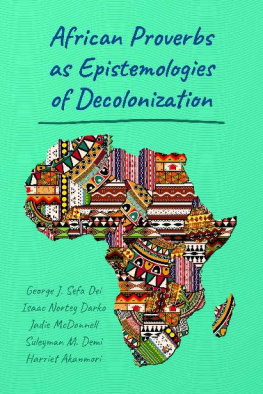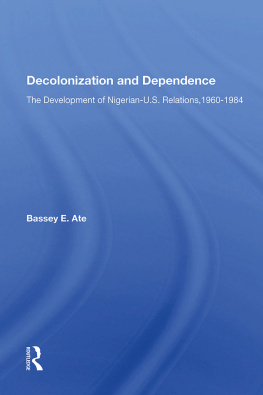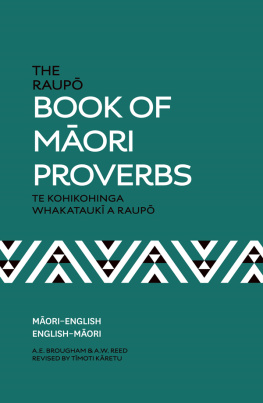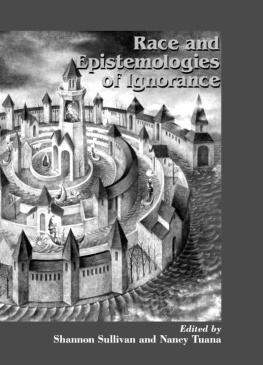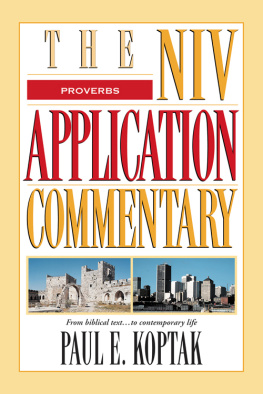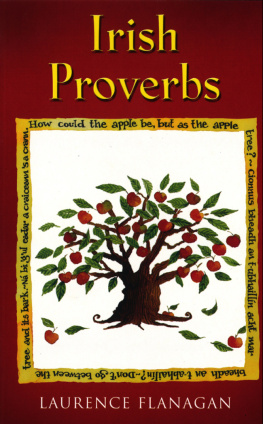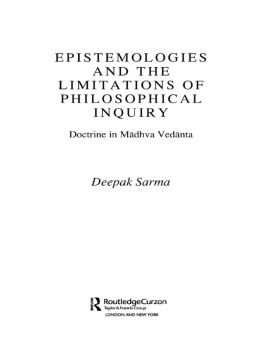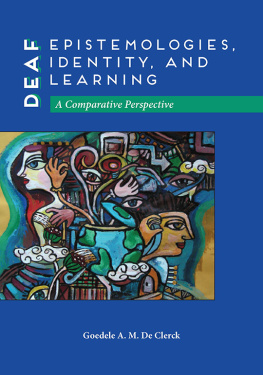This book is part of the Peter Lang Education list.
Every volume is peer reviewed and meets
the highest quality standards for content and production.
George J. Sefa Dei, Isaac Nortey Darko,
Jadie McDonnell, Suleyman M. Demi,
and Harriet Akanmori
African Proverbs as
Epistemologies of
Decolonization
Library of Congress Cataloging-in-Publication Data
Names: Dei, George J. Sefa (George Jerry Sefa), author.
Title: African proverbs as epistemologies of decolonization / George J. Sefa Dei.
Description: New York: Peter Lang, 2018.
Includes bibliographical references and index.
Identifiers: LCCN 2017022480 | ISBN 978-1-4331-3394-7 (hardback: alk. paper)
ISBN 978-1-4331-3393-0 (paperback: alk. paper) | ISBN 978-1-4331-4587-2 (ebook pdf)
ISBN 978-1-4331-4588-9 (epub) | ISBN 978-1-4331-4589-6 (mobi)
Subjects: LCSH: EducationAfrica. | Knowledge, Theory ofAfrica. |
Proverbs, African. | DecolonizationAfrica.
Classification: LCC LA1503.7.D45 | DDC 370.96dc23
LC record available at https://lccn.loc.gov/2017022480
DOI 10.3726/b11366
Bibliographic information published by Die Deutsche Nationalbibliothek.
Die Deutsche Nationalbibliothek lists this publication in the Deutsche Nationalbibliografie; detailed bibliographic data are available on the Internet at http://dnb.d-nb.de/.
2018 Peter Lang Publishing, Inc., New York
29 Broadway, 18th floor, New York, NY 10006
www.peterlang.com
All rights reserved.
Reprint or reproduction, even partially, in all forms such as microfilm, xerography, microfiche, microcard, and offset strictly prohibited.
About the author(s)/editor(s)
George J. Sefa Dei is Professor of Social Justice Education at the Ontario Institute for Studies in Education at the University of Toronto (OISE/UT), and is Director for the Centre for Integrative Anti-Racism Studies at the University of Toronto, Canada. His teaching and research interests are in the areas of anti-racism, minority schooling, international development, anti-colonial thought, and Indigenous knowledges systems.
Isaac Nortey Darko is Assistant Professor of Education at Burman University, Alberta, Canada. He spends most of his time, academically and professionally, teaching and engaging in conversations around Indigenous knowledge, spirituality, education/ schooling, environmental sustainability, equity, race, health, governance, and information communication technology.
Jadie McDonnell holds an MA in adult education and community development, and in comparative, international, and development education. She is a curriculum design specialist currently working in the field of transformative, trauma-informed education and community development in Canada and Kenya.
Suleyman M. Demi is a PhD candidate and environmental educator with research interests spanning environmental sustainability, social and environmental justice, and Indigenous knowledge and philosophy. He has authored and co-authored articles on traditional ecological knowledge and indigenous foods and chronic diseases, among others.
Harriet Akanmori is a PhD candidate at the University of Toronto, Ontario Institute for Studies in Education. Her research focuses on the disengagement of minority youth in general and black male youth in particular from high schooling, and on the school-toprison pipeline in Canada.
About the book
African Proverbs as Epistemologies of Decolonization calls for a rethinking of education by engaging African proverbs as valuable and salient epistemologies for contemporary times. The book addresses the pedagogic, instructional, and communicative relevance of African proverbs for decolonizing schooling and education in pluralistic contexts by questioning the instructional, pedagogic, and communications lessons of these proverbs and how they can be employed in the education of contemporary youth. It presents a critical discursive analysis of proverbs from selected African contexts, highlighting the underlying knowledge base that informs these cultural expressions. Explore alongside the book the ways in which these Indigenous teachings can be engaged by schools and educators to further the objective of decolonizing education by providing a framework for character education. This character-based framework equips the learner to be knowledgeable about power, equity, ethics and morality, and to develop a conscience for social responsibility, as well as to embrace traditional notions of self-discipline, probity, and hard work. This text goes beyond the mere documentation of proverbs to tease out how embedded knowledge and cultural referents in these knowledge bases and systems are critical for transforming education for young learners today.
This eBook can be cited
This edition of the eBook can be cited. To enable this we have marked the start and end of a page. In cases where a word straddles a page break, the marker is placed inside the word at exactly the same position as in the physical book. This means that occasionally a word might be bifurcated by this marker.
Table of Contents
| xvii
From George Deis longitudinal studies on African Proverbs, Folktales and Story Forms: Lessons for Education in Pluralistic Contexts and Teaching Discipline, Respect and Character Education: What Can Be Learned from Schooling in Pluralistic Contexts there are so many Ghanaian, Nigerian, Kenyan, South African and Canadian local research assistants and consultants, students, parents and Elders to thank. Very likely, we will miss some very important helpers as well.
In Nigeria there is Lateef Layiwola, Joy Odewumi, Chinyere Eze, Provost Hakeem Olato Kunbo Ajose-Adeogun, Tola Olajuwon, Dr. A. O. K. Noah, not to mention the many students and educators at the Adeniran Ogunsanya College of Education in Otto/Ijanikin, Lagos State, and the Lagos State University, Lagos. In Kenya, George Dei wants to thank particularly Samuel Njagi, Grace Makumi, Moodley Phylis, and the students and educators at Eggerton University, Ngoro, Nakuru and the University of Nairobi, Gichugu Primary School, Kandori Youth Polytechnic in the Embu area, Kenya. In Ghana, special thanks to Anane Boamah, Osei Poku, Kate Araba Stevens, Daniel Ampaw, Ebenezer Aggrey, Paa Nii, Alfred Agyarko, Pastor Samuel Amoani, Raphael Ampadu, Professor Kola Raheem, and the many students, educators at local universities, and parents and Elders who generously gave their time and expertise to ensure the success of the field study. There are also many educators at the School of Education, University of South Africa (UNISA) who helped shape George Deis ideas and understandings of xvii | xviii African Indigenous Philosophies. At the University of Toronto in Canada, George Dei is very grateful to Dr. Paul Adjei, Dr. Lindsay Kerr, Harriet Akanmori, Suleyman Demi, Jennifer Jaguire, Dr. Isaac Nortey Darko, Yumiko Kawano, Jadie McDonnell, Dr. Bathseba Opini, Shaista Patel, Mini Tharakkal, Emma Ntow and Michael Nwalutu. Finally, we acknowledge the Social Science Research Council of Canada (SSHRC), and the Literacy and Numeracy Secretariat of the Ontario Ministry of Education, for funding of the various phases of the research project.
| 1
Today, decolonization can be said to be an over-used word. Nonetheless, decolonization is an action-oriented process that can eventually lead to social and educational change. Decolonization is about re-envisioning the social order starting with the self as learner, by becoming conscious and critical of what we think, do, and say in our daily lives, and with respect to our communities. In particular, decolonization has far-reaching implications for the philosophical and pedagogical choices we make for educating the next generations, especially in the light of colonialization, hegemonic colonial narratives, and their continuing impact on Indigenous epistemological communities. But the question is, how exactly can we decolonize schooling and education using counter epistemologies and narratives?



